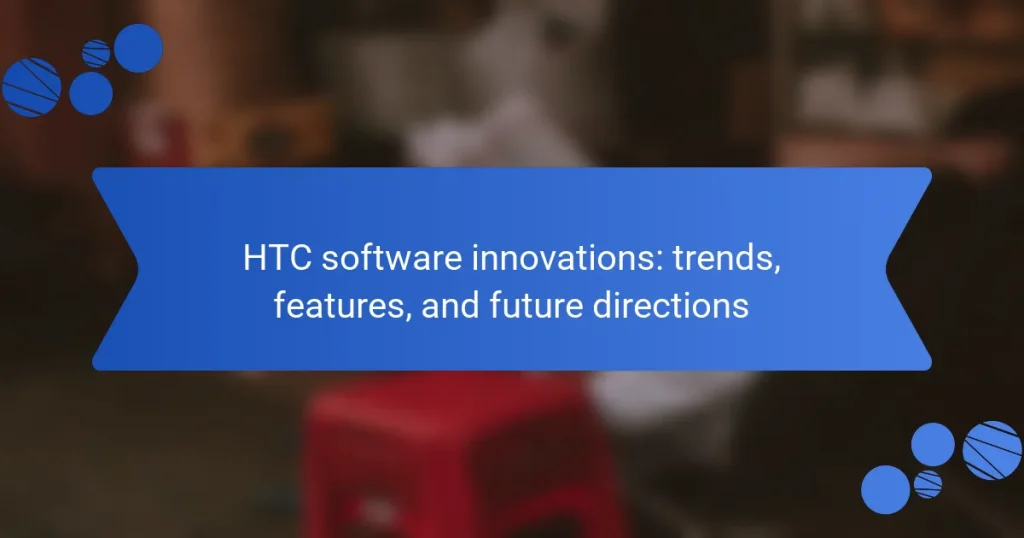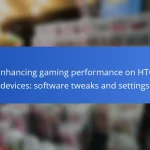HTC is a prominent technology company recognized for its software innovations in virtual reality (VR), augmented reality (AR), and mobile applications. The VIVE platform exemplifies HTC’s commitment to revolutionizing immersive experiences, while advancements such as 5G connectivity and the Sense UI enhance user interaction on smartphones. Future software developments are set to focus on integrating artificial intelligence (AI), improving cross-platform compatibility, and expanding applications in health, education, and gaming. Enhanced security features and cloud-based solutions are also anticipated in upcoming releases. Users can optimize their HTC experience through regular updates, community engagement, and customization of device settings.
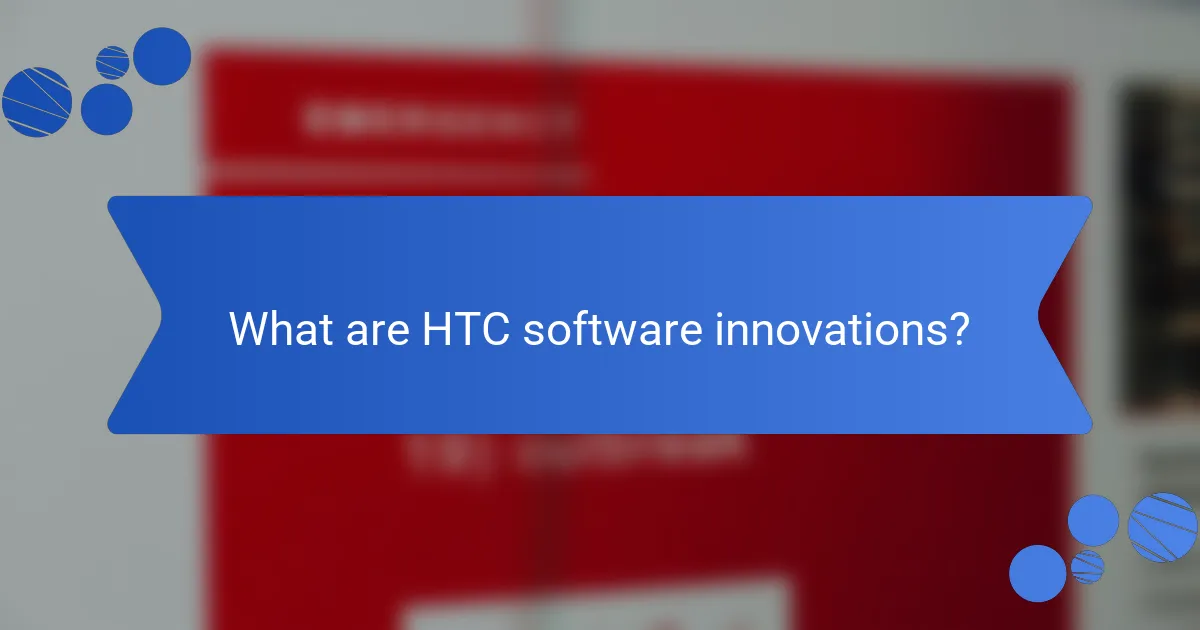
What are HTC software innovations?
HTC software innovations include advancements in virtual reality, augmented reality, and mobile applications. HTC is known for its VIVE platform, which revolutionizes virtual reality experiences. The company has integrated cutting-edge technologies like 5G connectivity into its devices. HTC’s Sense UI enhances user experience on smartphones. Innovations also extend to blockchain technology with the HTC Exodus smartphone. These developments position HTC as a leader in immersive technology and mobile software solutions.
How have HTC software innovations evolved over time?
HTC software innovations have evolved significantly since the company’s inception. Initially, HTC focused on Windows Mobile devices, providing basic functionalities. The introduction of the HTC Sense interface in 2010 marked a shift towards user-friendly experiences. Sense offered customizable home screens and integrated social media features.
As Android gained popularity, HTC adapted by launching devices like the HTC One series with enhanced multimedia capabilities. Innovations included BoomSound speakers and UltraPixel cameras, improving audio and image quality. Over time, HTC embraced virtual reality with the Vive platform, showcasing advancements in immersive technology.
Recent developments include advancements in AI integration and smart device connectivity. HTC also focuses on blockchain technology for secure data management. These trends reflect HTC’s commitment to adapting to consumer needs and technological advancements.
What historical milestones define HTC’s software journey?
HTC’s software journey is marked by several key historical milestones. In 2002, HTC released the HTC Wallaby, one of the first smartphones to run Windows Mobile. This device set the stage for HTC’s future in mobile software. In 2008, HTC introduced the HTC Dream, the first Android smartphone, showcasing its commitment to the Android ecosystem. The launch of HTC Sense in 2010 further defined its software identity, offering a unique user interface. In 2013, HTC’s partnership with Google led to the development of the Nexus 9 tablet, integrating HTC’s hardware with Google’s software. The introduction of HTC U11 in 2017 featured Edge Sense, a novel software interaction method. In 2020, HTC shifted focus to virtual reality, launching the Viveport platform for VR content. These milestones illustrate HTC’s evolution and innovation in mobile and VR software.
How have user needs influenced HTC’s software development?
User needs have significantly influenced HTC’s software development. HTC has prioritized user feedback to enhance user experience. This focus has led to the integration of features like Sense UI, which improves interface usability. Additionally, HTC has adapted its software to support evolving technologies such as 5G. User demands for better camera performance prompted HTC to develop advanced imaging software. The company also emphasizes security features in response to user concerns about data privacy. Regular software updates reflect HTC’s commitment to addressing ongoing user needs. These adaptations demonstrate HTC’s responsiveness to the market and user expectations.
What key features characterize HTC software innovations?
HTC software innovations are characterized by user-centric design, enhanced performance, and integration of cutting-edge technology. User-centric design focuses on intuitive interfaces and personalized experiences. Enhanced performance includes optimized battery usage and improved processing speeds. Integration of cutting-edge technology involves features like virtual reality and augmented reality capabilities. HTC often incorporates AI-driven functionalities for smarter user interactions. The company’s software updates frequently address user feedback for continuous improvement. Additionally, HTC emphasizes security through advanced encryption methods. These features collectively contribute to a robust and innovative software ecosystem.
Which technologies are integral to HTC’s software offerings?
HTC’s software offerings are integral to several key technologies. These include virtual reality (VR) platforms such as Viveport. HTC also utilizes augmented reality (AR) technologies in its applications. Additionally, the company employs artificial intelligence (AI) to enhance user experiences. Cloud computing plays a role in HTC’s software ecosystem for data management. Furthermore, HTC integrates blockchain technology for security features. These technologies collectively support HTC’s innovative software solutions.
How do these features enhance user experience?
HTC software innovations enhance user experience by providing intuitive interfaces and seamless functionality. These features simplify navigation, making it easier for users to access applications and settings. Enhanced personalization options allow users to customize their devices to fit individual preferences. Improved performance optimization leads to faster app loading times and smoother multitasking. Additionally, robust security features protect user data, fostering trust and confidence. Regular software updates ensure users benefit from the latest enhancements and security patches. User feedback is often incorporated into updates, aligning software improvements with user needs. Overall, these innovations contribute to a more satisfying and efficient user experience.
What trends are shaping HTC’s software innovations today?
HTC’s software innovations today are shaped by trends in artificial intelligence, user experience design, and 5G integration. Artificial intelligence is enhancing device capabilities through smarter applications and personalized user experiences. User experience design focuses on intuitive interfaces and seamless interactions. The integration of 5G technology is enabling faster connectivity and new application possibilities. These trends are driving HTC to develop software that meets evolving consumer expectations. For instance, HTC’s recent software updates have incorporated AI features that improve camera performance and battery management. The company’s commitment to user-centric design is evident in its latest software releases, which prioritize ease of use and accessibility. Additionally, HTC’s collaboration with telecom partners highlights its focus on leveraging 5G for innovative applications.
How is the rise of AI impacting HTC software solutions?
The rise of AI is enhancing HTC software solutions significantly. AI integration allows for improved user experiences through personalized content and recommendations. It streamlines operations by automating routine tasks, increasing efficiency. Additionally, AI-driven analytics provide valuable insights for product development. HTC’s software can now adapt to user behavior in real-time. This adaptability leads to more intuitive interfaces and functionalities. The use of AI also strengthens security measures within HTC software. Overall, AI is a transformative force in HTC’s software innovations, driving future advancements.
What role does cloud computing play in HTC’s software strategy?
Cloud computing is integral to HTC’s software strategy. It enables HTC to enhance device performance and user experience. By leveraging cloud infrastructure, HTC can offer seamless updates and services. This approach reduces the need for extensive local storage on devices. Furthermore, cloud computing supports HTC’s focus on IoT and smart home solutions. It allows for real-time data processing and analytics. HTC’s cloud services also facilitate collaboration across its software ecosystem. This strategy positions HTC to adapt quickly to market changes and consumer needs.
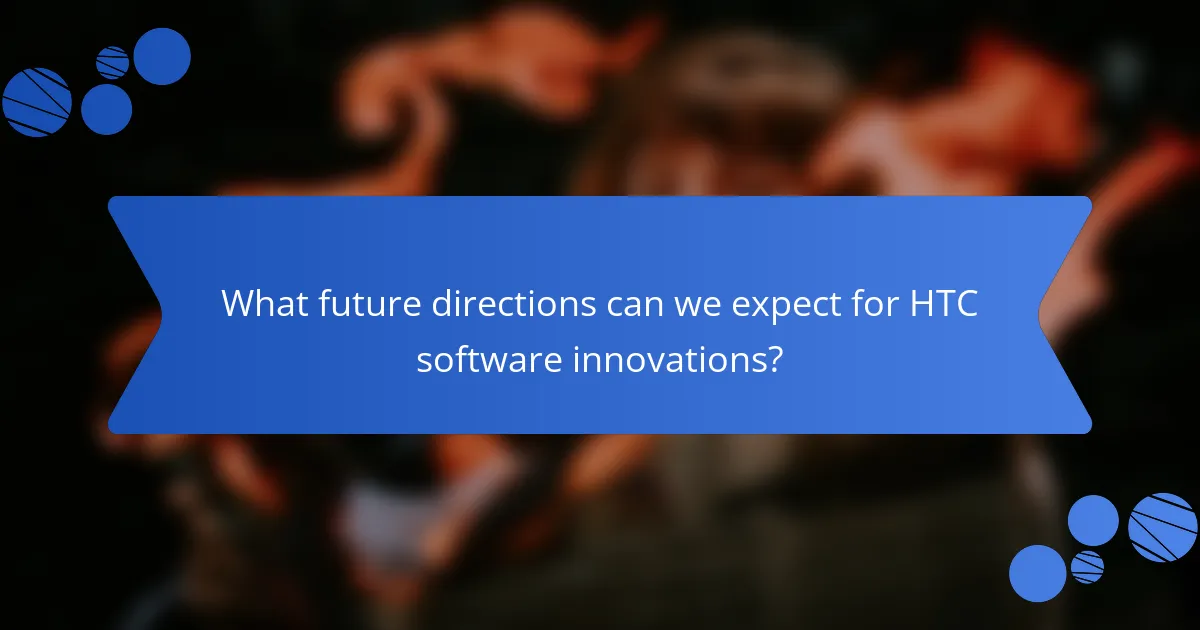
What future directions can we expect for HTC software innovations?
HTC software innovations are expected to focus on enhancing virtual reality (VR) and augmented reality (AR) experiences. The company aims to integrate AI technologies to improve user interactions. Future software updates will likely prioritize cross-platform compatibility, enabling seamless use across devices. HTC plans to expand its ecosystem with more applications for health, education, and gaming. Enhanced security features will be a key focus in upcoming software releases. The company is also expected to invest in cloud-based solutions for improved performance. These directions align with industry trends towards immersive technologies and user-centric design.
How is HTC planning to adapt to emerging technologies?
HTC is planning to adapt to emerging technologies by focusing on virtual reality and augmented reality innovations. The company aims to enhance its product offerings in these areas. HTC is investing in research and development to create immersive experiences. This includes developing advanced VR headsets and AR applications. The company is also collaborating with software developers to expand its ecosystem. HTC’s commitment to 5G technology will improve connectivity for its devices. These strategies position HTC to remain competitive in a rapidly evolving tech landscape.
What potential advancements in AR/VR can HTC explore?
HTC can explore advancements in AR/VR through enhanced hardware capabilities. Improvements in display resolution can lead to more immersive experiences. Incorporating eye-tracking technology can enhance user interaction. Advancements in haptic feedback can create a more tactile experience. Developing cloud-based processing can reduce hardware limitations. Integrating AI for personalized content can improve user engagement. Collaborations with gaming and educational sectors can expand application areas. These advancements align with industry trends focusing on realism and user experience.
How might 5G technology influence HTC’s software development?
5G technology is likely to significantly influence HTC’s software development. It will enable faster data transfer and lower latency. This can enhance mobile applications and services offered by HTC. Developers can create more complex and data-intensive applications. The increased bandwidth allows for improved virtual and augmented reality experiences. HTC can leverage 5G to optimize cloud-based services and IoT integration. Enhanced connectivity will facilitate real-time data processing and analytics. Overall, 5G will drive innovation in HTC’s software ecosystem.
What are the anticipated challenges for HTC in the software landscape?
HTC faces several anticipated challenges in the software landscape. Competition from established tech giants is a significant hurdle. Companies like Apple and Samsung dominate the market with robust ecosystems. HTC must innovate to differentiate its software offerings. Consumer expectations for seamless integration and user experience are rising. Meeting these demands requires substantial investment in development. Additionally, maintaining software security is increasingly critical. Cyber threats pose risks to user data and brand reputation. HTC also needs to adapt to rapid technological advancements. Keeping pace with trends like AI and 5G is essential for relevance. Finally, attracting and retaining skilled software engineers presents ongoing difficulties. The tech talent pool is competitive, making recruitment challenging for HTC.
How can HTC overcome competition in the software market?
HTC can overcome competition in the software market by focusing on unique software innovations. Developing exclusive features that enhance user experience is essential. For instance, HTC could leverage augmented reality and virtual reality technologies. This aligns with current trends in immersive experiences. Collaborating with developers to create a robust app ecosystem is also vital. A diverse range of applications can attract more users to HTC devices. Additionally, prioritizing software updates can improve device longevity and user satisfaction. According to market analysis, timely updates can increase brand loyalty significantly. Engaging with the user community for feedback can drive future innovations. This approach ensures that HTC remains competitive and relevant in a rapidly evolving market.
What strategies can HTC implement to ensure innovation sustainability?
HTC can implement open innovation strategies to ensure innovation sustainability. Engaging external partners can enhance creativity and resource sharing. Collaborating with startups can bring fresh ideas and technologies. Investing in research and development is crucial for long-term innovation. Allocating a significant portion of revenue to R&D fosters continuous improvement. Building a strong internal culture of innovation encourages employee contributions. Providing training and resources empowers employees to experiment with new ideas. Lastly, adopting agile methodologies can increase responsiveness to market changes. These strategies collectively promote a sustainable innovation ecosystem at HTC.
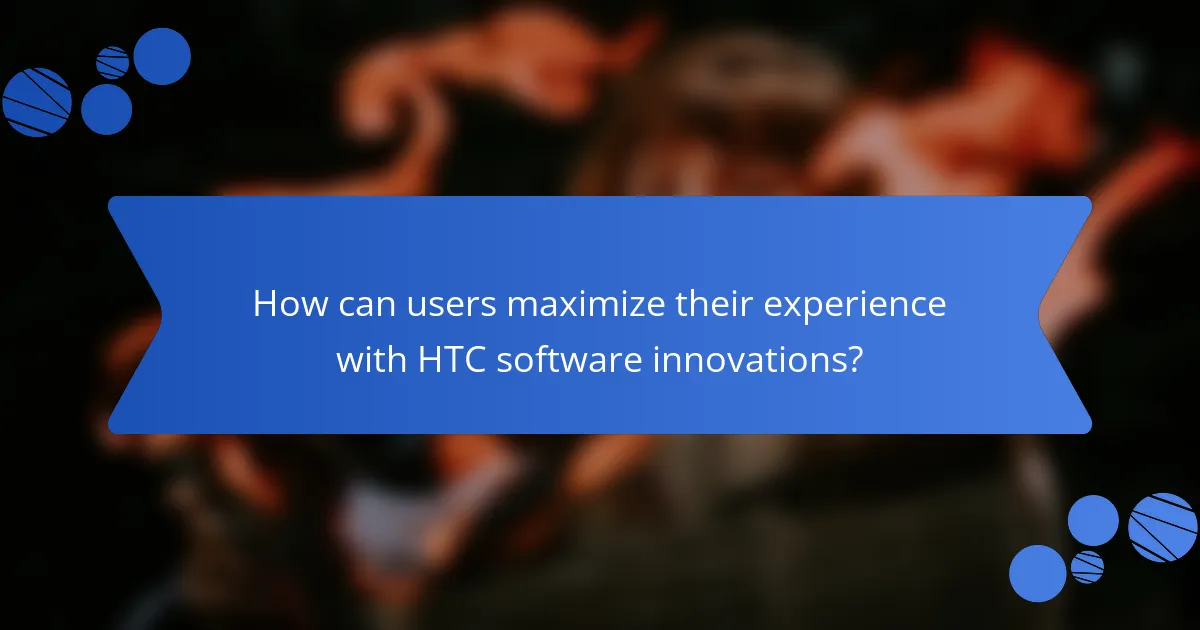
How can users maximize their experience with HTC software innovations?
Users can maximize their experience with HTC software innovations by regularly updating their devices. Software updates often include new features, security enhancements, and performance improvements. Engaging with HTC’s community forums can provide insights and tips from other users. Utilizing HTC’s official apps ensures access to the latest tools and functionalities. Customizing device settings can enhance usability and tailor the experience to personal preferences. Exploring HTC’s support resources can help users troubleshoot issues effectively. Participating in beta programs allows users to experience new features before official releases. Lastly, leveraging HTC’s integration with other platforms can expand functionality and enhance overall experience.
What best practices should users follow when utilizing HTC software?
Users should follow specific best practices when utilizing HTC software. First, ensure that the software is regularly updated to benefit from the latest features and security patches. This practice enhances performance and protects against vulnerabilities. Second, utilize the official documentation and user guides provided by HTC. These resources offer essential insights and troubleshooting tips tailored to the software. Third, engage with the HTC community forums for shared experiences and solutions from other users. This interaction can provide practical advice and support. Fourth, back up data regularly to prevent loss due to software issues or unexpected failures. Backups safeguard important information and ensure continuity. Lastly, customize settings according to personal or organizational needs for optimal functionality. Tailoring the software enhances user experience and effectiveness. Following these best practices will lead to improved performance and satisfaction with HTC software.
How can users stay updated on new features and updates?
Users can stay updated on new features and updates through official HTC channels. These include the HTC website, where release notes are often published. Social media platforms like Twitter and Facebook provide real-time announcements. Users can also subscribe to newsletters for direct updates. Forums and community pages are valuable for user discussions and insights. Additionally, enabling notifications in HTC applications ensures timely alerts. Regularly checking the HTC blog offers in-depth information on innovations. These methods ensure users receive the latest information efficiently.
What troubleshooting tips can enhance user experience with HTC software?
To enhance user experience with HTC software, users should consider several troubleshooting tips. First, regularly update the software to the latest version. This ensures access to new features and security improvements. Second, clear the cache of the HTC applications. This can resolve performance issues and improve responsiveness. Third, reboot the device to refresh system processes. A simple restart can fix minor glitches. Fourth, check for app compatibility. Some apps may not function well with older software versions. Fifth, reset network settings if experiencing connectivity issues. This can resolve Wi-Fi or Bluetooth problems. Finally, consult HTC support for persistent issues. Access to professional assistance can provide tailored solutions. These tips collectively contribute to a smoother user experience with HTC software.
HTC software innovations encompass advancements in virtual reality, augmented reality, and mobile applications, with a focus on user-centric design and enhanced performance. Key features include the VIVE platform, Sense UI, and integration of AI and blockchain technologies. The article outlines the evolution of HTC’s software, significant historical milestones, and how user needs have shaped development. Current trends, including 5G integration and AI impact, are discussed, along with future directions for HTC’s software innovations. Strategies for users to maximize their experience and best practices for utilizing HTC software are also highlighted.
